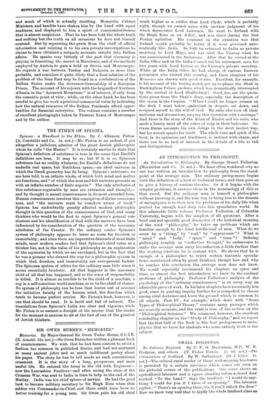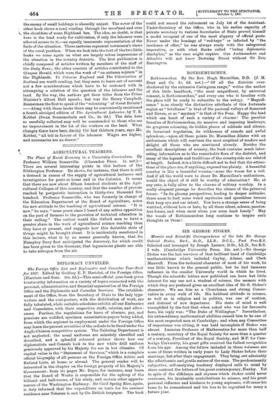SMALL HOLDINGS.
To Colonise England. By C. F. G. Masterman, M.P., W. B. Hodgson, and others. (T. Fisher Unw in. 2s. 6d. net.)—The Colonisation of Scotland. By W. Sutherland. (D. J. Rider. Is. net.)—The critical rural reader of these well-meaning brochures is provoked by a certain viewiness which comes out even on the pictorial covers of the publications. One cover shows an agricultural labourer and a squire standing before a closed door marked " To the Land." Says the landlord : " I would do any- thing I could for you if I knew of an opening." The labourer replies : " There's an opening there, Sir, if you'd unlock the door." Now we know very well that to typify the whole landlord class as
the enemy of small holdings is absurdly unjust. The cover of the other book shows a road winding through the moorland and over
I., the shoulders of some Highland ben. The idea, no doubt, is that here is the land ready for cultivation, if only the labourer were allowed access to it,—an equally inaccurate representation of the facts of the situation. These cartoons represent townsmen's views of the rural problem. When we look into the text of the two little books we come again on what are largely urban impressions of the situation in the country districts. The first publication is chiefly composed of articles written by members of the staff of the Daily News ; the other consists of articles contributed to the Glasgow Herald, which were the work of "an autumn sojourn" in the Highlands. To Colonise England and The Colonisation of Scotland are worth reading, but they seem to leave out of account not a few considerations which have to be reckoned with in attempting a solution of the question of the labourer and the land. By the way, the authors get their titles from the Prime Minister's Albert Hall speech ; but was Sir Henry Campbell- Bannerman the first to speak of the "colonising " of Great Britain ? —Along with these books there may be conveniently mentioned a fourth abridged edition of The Agricultural Labourer, by T. E. Kebbel (Swan Sonnenschein and Co., 2s. 6d.) The data here so carefully collected may well be commended to those who see no improvement in the lot of the workers on the land. What changes there have been during the last thirteen years, says Mr, Kebbel, " all tell in favour of the labourer. Wages are higher, and necessaries are no dearer."































































 Previous page
Previous page